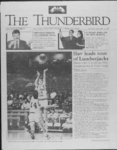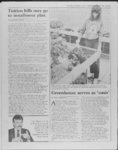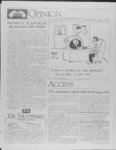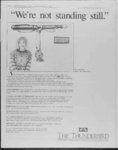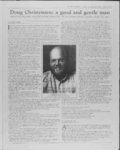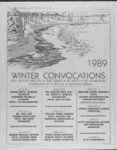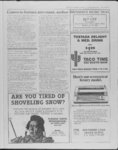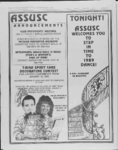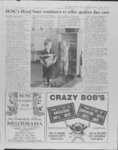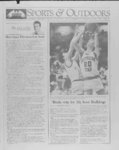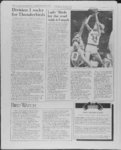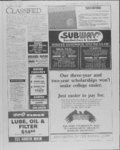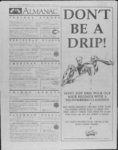| OCR Text |
Show THE THUNDERBIRD SUSC TUESDAY JANUARY 3, 1989 PAGE 7 Award winning writer , who died of heart attack Dec . 16, was to have become associate adviser this week BY LARRY BAKER ITS w NOT OFTEN THAT A JOURNALIST HAS THE OPPORTUNITY-AN- D n painful need to write a story. This is such an occasion, for the of Doug Christensen on Dec. 16 just two weeks short of his 31st birthday is one that ends, in most ways, the life of a good and gentle man. It ends the life of a man and this is the pith of why I choose to write these words who knows more about me than anyone who has walked this earth. Many of us, whether we break it down into those terms or not must deal with that kind of a loss in our lives. It is not easy. Because of it, Im hoping that readers will see this page not as one of indulgence on my part, but more of tribute and, perhaps, a lesson to us all about the worth of love and friendship and of recognizing and embracing that one person who is our confessor. Doug, who was as Ive said on numerous occasions the most excellently versatile and most versatilely excellent writer Ive ever known, was to have begun work this week as associate adviser of this newspaper. He was to have served as an extension of me because he was the only person who could have done so. To understand why, one must go back 10 years to Logan, Utah, where I was a young and inexperienced adviser to the student newspaper at Utah State University. One day there came an overweight, rather mature looking elitist intellectual who said he wished to write for the paper. He was sent out on the toughest story we could find and came back with an eloquent yet succinct, long yet short, passionate yet unbiased masterpiece. He became the golden boy of the staff-o-ne who could be sent out on any story and see the full breadth of it, see the questions that begged to be asked, ask them, and see that the answers fit the context the reader begged for. Moreover, he could write as lyrically and as sensitively as the situation allowed. His background was a rather diverse one. He had been raised in rural Utah and southern California and had attended and excelled at Snow College in Ephraim, Utah, active in the theatre and serving two terms as social vice president of the student body. At USU, he progressed to associate editor of the paper, The Utah Statesman, responsible for assignments of stories, a weekly column and an occasional story that he thought might be over the heads of other members of the staff. Again, he was an elitist, but not an offensive one. He was a source of diversion for the staff, too. Alternately reflective and manically entertaining, he would one day climb atop a desk and shimmy to a Beatles tune and the next sit silently staring out the window for an hour or two. He was a true newsman, though. In 1981, he was the journalist of the year for the Rocky Mountain Collegiate Press Association, selected from among hundreds of students from colleges and universities across 16 states. A news release was sent, and Salt Lake Citys Deseret News was impressed enough by Doug and his accomplishment to offer him a job and this perplexed him as the pedants of the communication department told him it was more important to get his degree. He asked me for advice, knowing I needed him at our paper.' Why do you want a degree, Doug? To get a job, he replied. Well? said I, trying to sound as wise as possible. He spent three years with the Deseret News and I stayed as close to him as feasible. He was a steady and beautiful letter writer and it was relatively exciting for me to vicariously live, once again, the life of a daily reporter. The lure of the city drew me as well and I once again found myself close to Doug as I worked a year for another paper in Salt Lake. Then, I moved to Cedar City and a year later, Doug left the Deseret News. He was somewhat disenchanted with journalism and its challenges, wanting to return to the theatre. I convinced him, perhaps selfishly, to enroll here where he could work on the paper and also be involved in theatre. ' Whatever my motives and using his talents to move The Thunderbird along was certainly a large factor in wanting him here it seems in retrospect to have been a good move. Doug thrived here as he took up residence in a spare bedroom in my home and proceeded to use up a great deal of electricity with his computer. He proved a valuable asset to the college. He assisted in the information services office, judged occasional debate tournaments and, with his superior intellect, nonthreateningly challenged faculty members in class. Although editor of The Thunderbird and also editor of SUSCs literary magazine in 1984, he was truly moved by theatre. He wished to be a playwright. first-perso- . He took several roles in SUSC productions along the way. Perhaps his best in To Gillian on her 37th Birthday. performance was as a wisecracking brother-in-laAudiences loved him and he was the years Peoples Choice best supporting actor. But all the while, he was writing plays. He began here with one that had some problems and Douglas H. Baker worked with him and the problems1 turned into award-winnin- g Sander , a critically-acclaimeplay. Later plays were to win awards as well. Doug worked summers for the Utah Shakespearean Festival as a publicist, where his experience in the media and his writing abilities proved invaluable. In 1987, he was accepted into the masters play writing program at Philadelphias Temple University, but failing health forced his return to Utah where he worked steadily for the USF, and then The Daily Spectrum. He left the paper a few weeks before his death to return home to Redmond to finish Nothing Like The Sun, a play he was commissioned to write by the Festival. Several of us at SUSC had the opportunity to speak to him two days before his death at home in Redmond as a result of a heart attack. He was in a phone mood. Agreed is that he was truly happy, as gleeful about life as we had heard him for some time. Doug will live on through his work. Nothing Like the Sun will see to that, if nothing else. A treatment of a relationship between Shakespeare and rival Ben Jonson, vehicle for Patrick Page to be staged in it is a one-ma- n Randall the new Jones theatre this summer. Although not quite complete at Dougs death, it will be finished by director Scott Phillips with my help. We hope to do it justice. I had the privilege of speaking at Dougs funeral Dec. 19. I submit an excerpt here: as if Doug had resigned himself to a life of to fight it would drain his other energies that he gave to us. For Doug truly gave. He was a forgiving man who remained true and loyal to us despite our petty betrayals, breaches of faith and occasional inhumanity. He was a complex and multi-facete- d man, one who believed in many things, including: the principles upon which our country was founded; the wonderful richness of a Nestles Crunch bar; the depth and complexity of politics; the principles of the L.D.S. Church; the wonderment of science fiction and fantasy; in the strategy but not implementation of war. e He believed in the simplistic beauty of a on a warm summer day and the sweet, solid plunk of a racquetball coming fast off a wall. Doug believed in the limitlessness of the human mind and imagination, in the eternal beauty and essential goodness and nobility of the human spirit. But finally, and most assiduously, Doug believed in the power and the glory of the written and interpreted word. He believed in the power of human communication to lift us, to lift our spirits, both in the direct and immediate sense and in the lasting, the eternal sense. I turn to Dougs play Sander as a touchstone for us to embrace and remember understand, Doug. The plays telling point is a poem written by Tobe, Sanders greatest admirer. Although the poem deals with the funeral of Sander, please do not see Doug here, for, as we shall see, Doug was not Sander. Sander was weak where Doug was strong. d, line-driv- And the choir sang a hymn they hadnt practiced because no one could find the time and the preacher thanked God and the Readers Digest for the sermon and asked Sanders mother to come to the casket and lean over it and kiss his cold lips reminding me of something Sander said between swallows ' about the fish walking home when the river runs dry and the whores and the similies and having his fill of wine or was it just the blue eyes that waited for the whip " So I pulled the fire alarm and granted Sanders last wish. Again, it would be a mistake to cast doug Christensen character Sander, who asked his friend Tobe to grant his wish that, he not be ripped into a thousand pieces for those who are left behind to take and use for themselves. No, do not make that mistake, for that is precisely what we must do with Doug. That is what Doug was here for. That is what Doug would have us do. That was the Christ-lik- e jigsaw puzzle that was quality of Doug Christensen and the 1000-piec- e each of us will live with us Doug in life shall be Doug in death. What he was to forever and, I truly hope, will grow within and among us. Dougs spirit is with us and we must share as much of it with each other as we can. There will be no pulling of the fire alarm today. |

